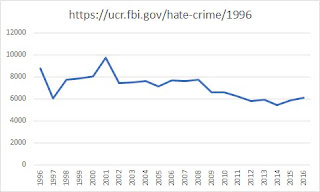One Article Review
| Source | |
|---|---|
| Identifiant | 435916 |
| Date de publication | 2017-11-17 17:55:29 (vue: 2017-11-17 17:55:29) |
| Titre | How to read newspapers |
| Texte | News articles don't contain the information you think. Instead, they are written according to a formula, and that formula is as much about distorting/hiding information as it is about revealing it.A good example is the following. I claimed hate-crimes aren't increasing. The tweet below tries to disprove me, by citing a news article that claims the opposite:Ugh turns out you're wrong! I know you let quality data inform your opinions, and hope the FBI is a sufficiently credible source for you https://t.co/SVwaLilF9B- Rune Sørensen (@runesoerensen) November 14, 2017But the data behind this article tells a very different story than the words.Every November, the FBI releases its hate-crime statistics for the previous year. They've been doing this every year for a long time. When they do so, various news organizations grab the data and write a quick story around it.By "story" I mean a story. Raw numbers don't interest people, so the writer instead has to wrap it in a narrative that does interest people. That's what the writer has done in the above story, leading with the fact that hate crimes have increased.But is this increase meaningful? What do the numbers actually say?To answer this, I went to the FBI's website, the source of this data, and grabbed the numbers for the last 20 years, and graphed them in Excel, producing the following graph: As you can see, there is no significant rise in hate-crimes. Indeed, the latest numbers are about 20% below the average for the last two decades, despite a tiny increase in the last couple years. Statistically/scientifically, there is no change, but you'll never read that in a news article, because it's boring and readers won't pay attention. You'll only get a "news story" that weaves a narrative that interests the reader.So back to the original tweet exchange. The person used the news story to disprove my claim, but going to the underlying data, it only supports my claim that the hate-crimes are going down, not up -- the small increases of the past couple years are insignificant to the larger decreases of the last two decades.So that's the point of this post: news stories are deceptive. You have to double-check the data they are based upon, and pay less attention to the narrative they weave, and even less attention to the title designed to grab your attention.Anyway, as a side-note, I'd like to apologize for being human. The snark/sarcasm of the tweet above gives me extra pleasure in proving them wrong :). As you can see, there is no significant rise in hate-crimes. Indeed, the latest numbers are about 20% below the average for the last two decades, despite a tiny increase in the last couple years. Statistically/scientifically, there is no change, but you'll never read that in a news article, because it's boring and readers won't pay attention. You'll only get a "news story" that weaves a narrative that interests the reader.So back to the original tweet exchange. The person used the news story to disprove my claim, but going to the underlying data, it only supports my claim that the hate-crimes are going down, not up -- the small increases of the past couple years are insignificant to the larger decreases of the last two decades.So that's the point of this post: news stories are deceptive. You have to double-check the data they are based upon, and pay less attention to the narrative they weave, and even less attention to the title designed to grab your attention.Anyway, as a side-note, I'd like to apologize for being human. The snark/sarcasm of the tweet above gives me extra pleasure in proving them wrong :). |
| Envoyé | Oui |
| Condensat | 2017but @runesoerensen about above according actually answer anyway apologize are aren around article articles attention average back based because been behind being below boring but can change check citing claim claimed claims co/svwalilf9b contain couple credible crime crimes data decades deceptive decreases designed despite different disprove distorting/hiding does doing don done double down even every example excel exchange extra fact fbi following formula get gives going good grab grabbed graph:as graphed has hate have hope how https://t human increase increased increases increasing indeed inform information insignificant instead interest interests its know larger last latest leading less let like long mean meaningful much narrative never news newspapers not note november numbers only opinions opposite:ugh organizations original out past pay people person pleasure point post: previous producing proving quality quick raw read reader readers releases revealing rise rune say see side significant small snark/sarcasm source statistically/scientifically statistics stories story sufficiently supports sørensen tells than that them they think time tiny title tries turns tweet two underlying upon used various very weave weaves website went what when won words wrap write writer written wrong year years you your |
| Tags | Guideline |
| Stories | |
| Notes | |
| Move | 

|
L'article ne semble pas avoir été repris aprés sa publication.
L'article ne semble pas avoir été repris sur un précédent.